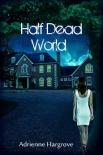Half Life Jillian Cantor (trending books to read .txt) 📖

- Author: Jillian Cantor
Book online «Half Life Jillian Cantor (trending books to read .txt) 📖». Author Jillian Cantor
“I worked,” Bronia finally says. “I worked and I worked and I studied, and I sank myself into the latest research, became a better physician for my patients.”
“Well, that is what I am doing,” I say.
“No.” She shakes her head. “You are taking the train into the city, teaching a class. What have you done in the lab?”
“How do you know what I do in my lab?” I snap at her.
But Bronia is right. I’ve read Pierre’s journals over and over again, tracing my fingers over his script. But I have not done anything new, anything important. I haven’t been able to bear it, the thought that I might discover something on my own, without him here beside me.
“Life is so very hard and tragic,” Bronia says, matter-of-factly, and I hate her for the scientific way she bears it out to me. “But you have this brilliant mind, and more resources here in Paris than we ever dreamed as girls. You cannot waste that.” She grabs my shoulders and holds on to them. “You cannot waste that.”
EVERYONE NEEDS SOMETHING, BRONIA SAID.
I think of that as I sit down to help Irène with her studies, and when I pay attention, look at what she has been doing, what she has been learning here in Sceaux, I feel like I have been asleep for 302 days, and I have let my daughter’s mind wither. She has not been learning anything! This will not do at all. The revelation that I have been so drowned in grief that I have let my daughter’s education lapse shocks me.
What have I done, moving us out to Sceaux, where it is so very quiet? In our old house on boulevard Kellerman, we were surrounded by neighbors who were friends and academics, professors. There were always lively conversations and debates in our garden with the Perrins and the Langevins, and the children would play, and they would listen, and they would learn. Irène has nothing here.
“You are not going to attend this school any longer,” I tell Irène. “I am going to start my own school.”
Her eyes widen a little. I am either frightening her or exciting her, or both.
The next morning, back at the university, I tell Jean Perrin and Paul Langevin about my desire. “If we all enroll our children together, we can make a collective school among us. We can all take turns teaching them. They can learn from real academics.”
Paul Langevin considers my idea, pulling on his mustache. Paul was Pierre’s student, once, long ago, and now he is a brilliant academic in his own right. He was also a good friend to Pierre before he died. I want his approval, as if in some strange way it is akin to Pierre’s approval. When he nods vigorously, I exhale. He is either as excited about this idea as I am, or excited that I have a new idea again. Any idea.
“The children will learn so much more from us. We will give them the best education,” I say. I had participated in Flying University once in Poland, self-taught in Szczuki. Learned from the best professors in Paris and have become one here myself.
Everyone needs something, Bronia said.
Then I remember: I need now what I have always needed—education.
BUT ORGANIZING OUR COLLECTIVE SCHOOL TO TEACH THE children isn’t enough for me. I need science too. I begin making plans for the lab, my lab now. The lab was where I felt most happy, most at home, even before I met Pierre. And I know it can be my place again, after him, too.
There is a generous donation from Andrew Carnegie from America, and I use it to hire several research assistants, including my nephew, Maurice, Jacques’s son. Jacques writes a very kind letter to thank me for my generosity, but he does not understand at all—Maurice, like Jacques, like Pierre, has a brilliant mind, and that is the reason why I hire him. He works hard, and he is very smart, and there is so much work to be done. We are attempting to purify radium chloride, isolating the radium metal. And we are trying again to determine the atomic weight of radium.
But when my assistants leave for the day, I stay in the lab often much too late, working on my own, too. I am developing a new method of measuring radium, a way to give weight to it. This excites me wildly, because if I can perfect it, it will allow radium to be used widely outside my laboratory, for the greater good of other scientists, or perhaps even doctors. And this, most of all, is what Pierre would’ve wanted.
The strangest thing is, when I am back in the lab again, back in the place Pierre and I fell in love and lived so many hours of our lives, that is the place where my mind can begin to carry on, where everything inside of me starts to lighten again. Late at night, all alone, the radium glows all around me, bright and beautiful and phosphorescent.
Marya
Loksow, Poland, 1908
Leokadia’s mother died in the beginning of February—I heard about it from her cousin, Zuzanna, who was a student in my introductory chemistry course. Leokadia and I still exchanged the occasional letter, but I hadn’t known her mother was sick, and the news from Zuzanna hit me with a sadness I did not expect.
Leokadia had done quite well for herself in the past few years; her career as a concert pianist was blossoming as she was traveling around Europe giving concerts to large, paying crowds. According to her most recent letter, she had spent the last months in Berlin, making a record.





Comments (0)